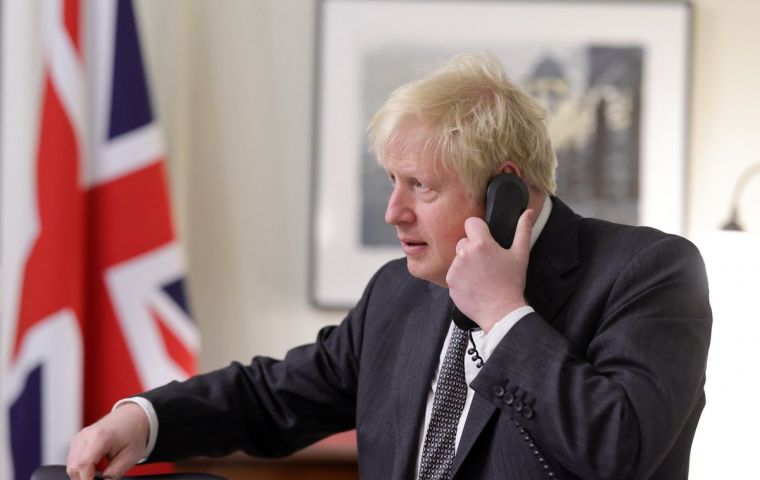MercoPress. South Atlantic News Agency
EU/UK reach post-Brexit deal on Northern Ireland; Johnson meets EC head in Brussels
 The unofficial agreement would coordinate border control checks specifically for export declarations and the supply of food products plants and animals
The unofficial agreement would coordinate border control checks specifically for export declarations and the supply of food products plants and animals The European Union and UK have reached an unofficial agreement on post-Brexit trade with Northern Ireland and its land border to the EU. The deal is not tied to last-gasp trade talks, but could help grease the wheels. The co-chairs of the EU-UK joint committee on Tuesday announced an “agreement in principle” pertaining in large part to the Irish border issue.
Although the agreement is not directly connected to the faltering last gap trade talks, it does signal progress in one of Brussels' main areas of concern outside the trade negotiations.
The issues were hammered out during a meeting on Monday between EU Vice-President Maros Sefcovic and the UK negotiator Michael Gove, according to a joint press statement issued by both the EU and the UK.
Cabinet Office Minister Gove, whose responsibilities include worst-case planning if no trade deal is reached with the EU, said that he was “delighted” to announce the partial breakthrough, thanking “Maros Sefcovic and his team for their constructive and pragmatic approach.”
The unofficial agreement would coordinate border control checks specifically for export declarations and the supply of food products plants and animals.
As a result of the agreement, the British government said it would remove controversial clauses 44, 45, and 47 of a domestic law, called the Internal Market Bill, which was seen in Brussels as a bid to breach international law and nullify a past agreement with the EU.
The agreement will be of particular importance for the border between Northern Ireland and the Republic of Ireland, which is to become the UK's only major land border (discounting British overseas territory Gibraltar) with the EU.
After decades of conflict on the island of Ireland, maintaining a broadly open border and reciprocal rights for citizens is crucial to upholding the terms of the Good Friday peace accord that ended the fighting.
Doing so with one party leaving the EU, however, has always been one of Brexit's biggest challenges.
The Republic of Ireland's prime minister, Micheal Martin, welcomed the agreement.
“Protecting the Good Friday agreement is vital,” Martin said.
Martin's foreign minister, Simon Coveney, welcomed the changes to the Internal Market Bill in particular, saying, “I hope this may also provide some of the positive momentum necessary to instill confidence and trust, and allow progress in the wider context of the future relationship negotiations.”
The agreement in principle will now need to be adopted during a meeting of the EU-UK Joint Committee, which will “take place in the coming days.”
Although the breakthrough on the Irish border issue was a welcome step forward, negotiators are still deadlocked on getting a post/Brexit trade deal done by the December 31 deadline.
The UK formally left the EU's political institutions in January this year, but remains in the bloc's single market and customs union in a transition period until the end of 2020.
Should no deal be reached by the deadline, the two sides face tariffs and trade quotas as well as tighter customs controls — likely causing severe economic disruption, particularly for the UK.
UK Prime Minister Boris Johnson said Tuesday that “the situation at the moment is very tricky.” “But hope springs eternal. I will do my best to sort it out if we can,” he added. “Our friends have to understand the UK has left the EU to exercise democratic control. We are a long way apart still.”
German European Affairs Minister Michael Roth said Tuesday that “political will in London” was necessary to get a trade deal done
“Our future relationship is based on trust and confidence. It's precisely this confidence that is at stake in our negotiations right now,” he said. Germany currently holds the EU's rotating presidency.
On Monday, a joint statement from Johnson and EU commission chief Ursula von der Leyen in Brussels spelled out ensuring a level playing field for competition, fisheries and governance
Johnson is due to meet von der Leyen in Brussels on Wednesday evening. On Thursday and Friday, EU leaders will meet in Brussels for their last summit before the trade deal deadline.




Top Comments
Disclaimer & comment rulesCommenting for this story is now closed.
If you have a Facebook account, become a fan and comment on our Facebook Page!